2024年中考英语二轮语法复习专题十二 句子的种类 课件
文档属性
| 名称 | 2024年中考英语二轮语法复习专题十二 句子的种类 课件 |

|
|
| 格式 | pptx | ||
| 文件大小 | 990.9KB | ||
| 资源类型 | 试卷 | ||
| 版本资源 | 通用版 | ||
| 科目 | 英语 | ||
| 更新时间 | 2024-03-09 20:17:57 | ||
图片预览

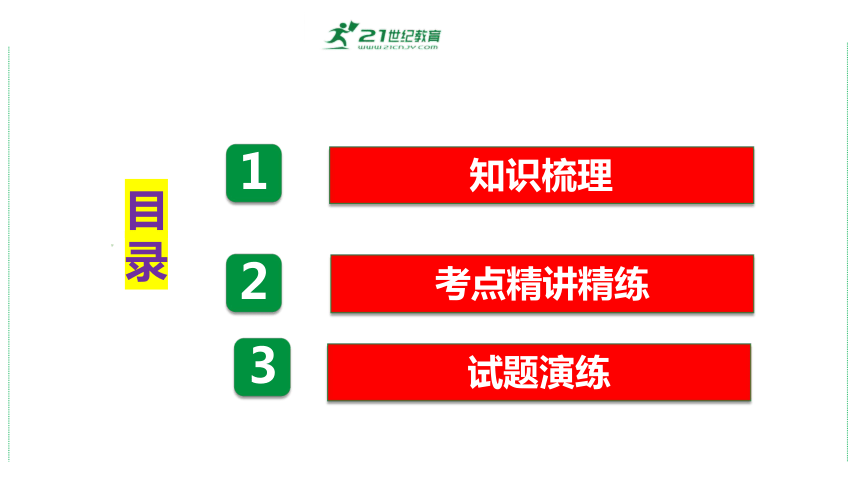
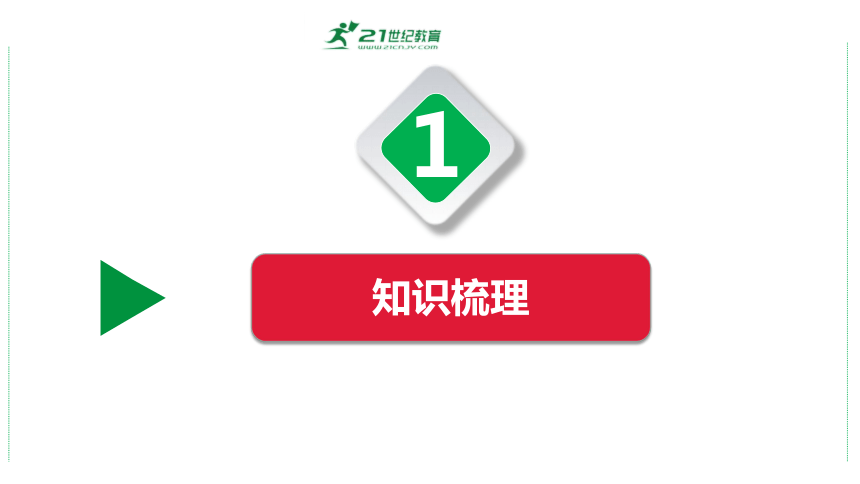
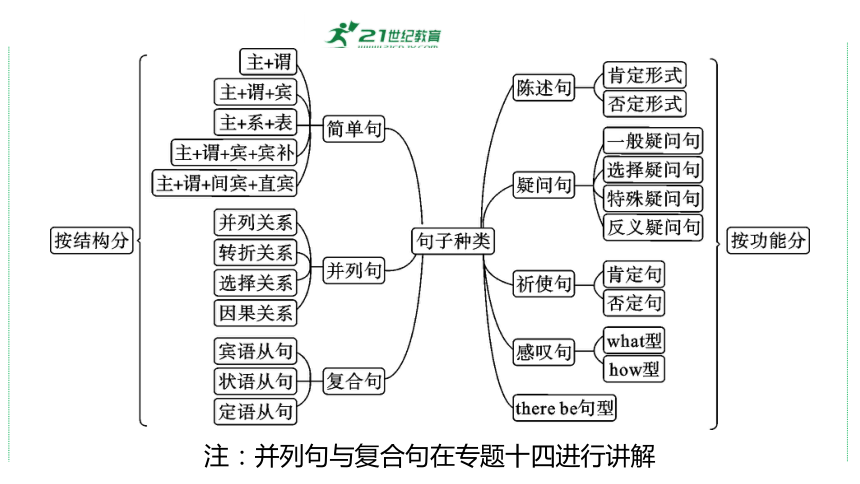

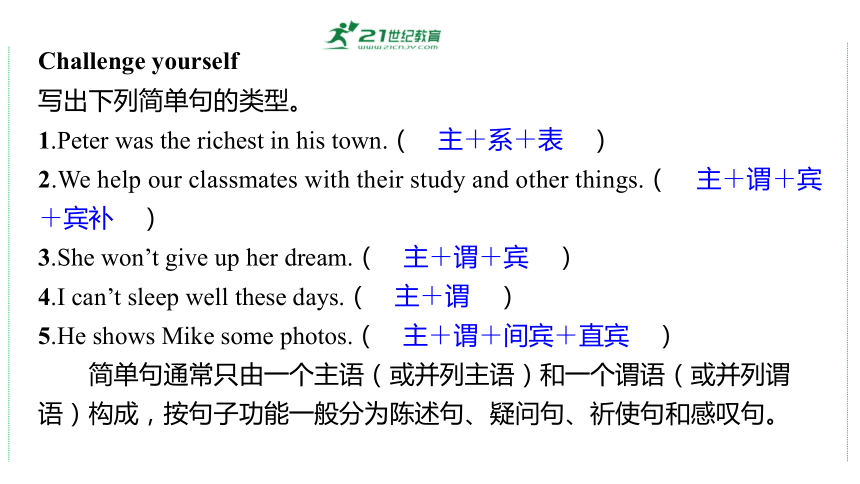
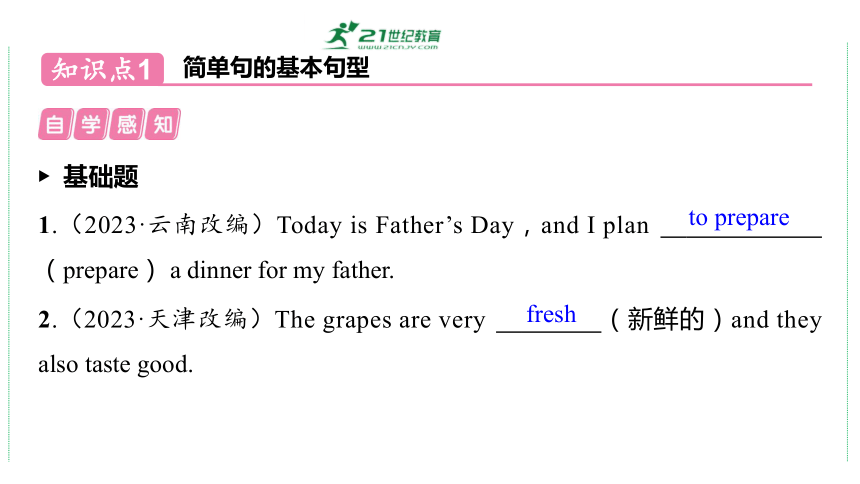
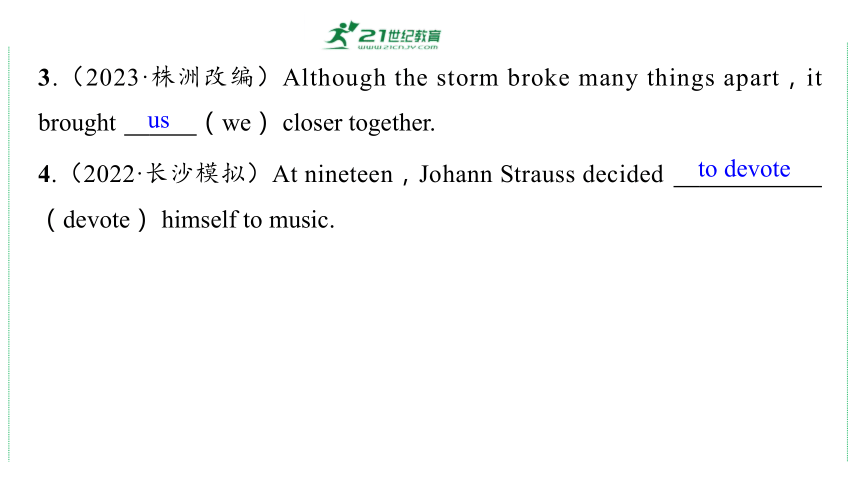
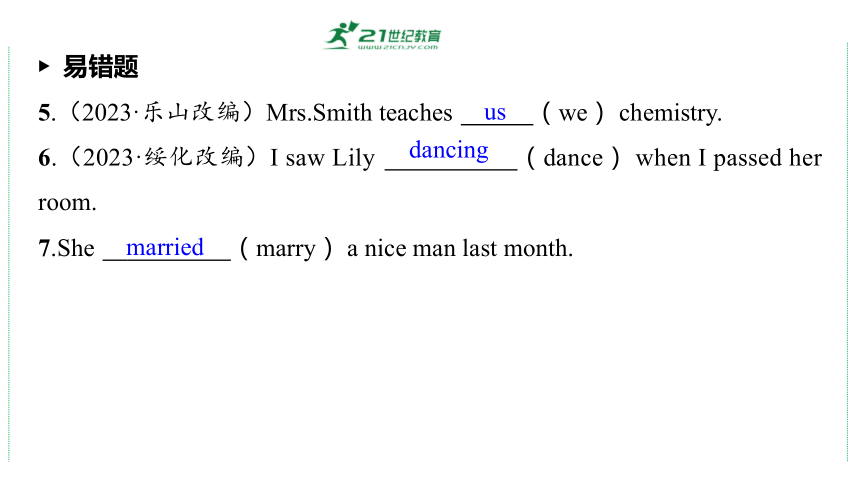
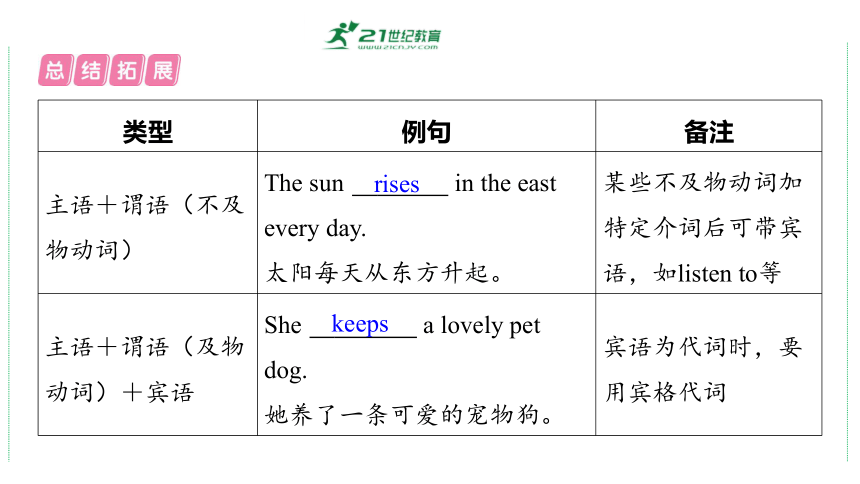
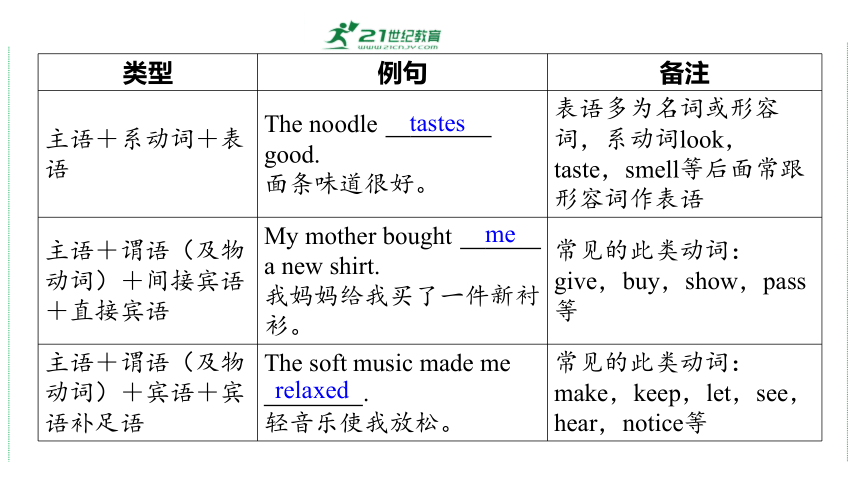
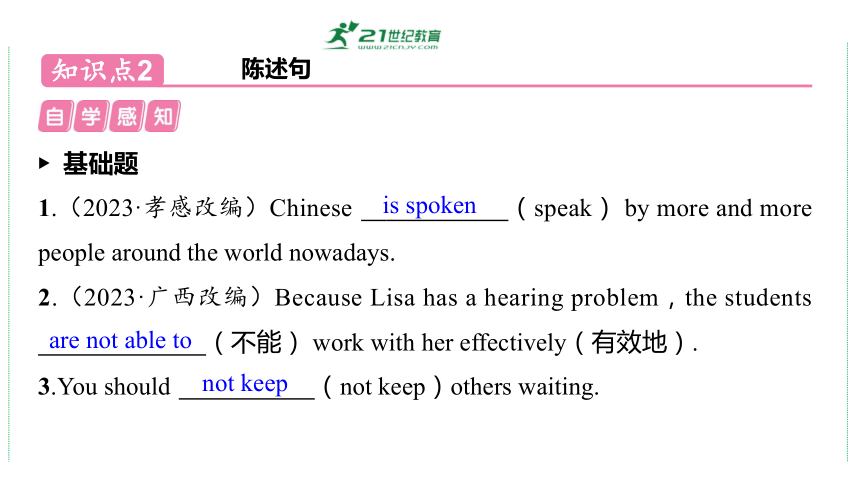
文档简介
(共45张PPT)
专题十二 句子的种类
中考英语二轮复习语法梳理
目
录
1
知识梳理
2
考点精讲精练
3
试题演练
1
知识梳理
注:并列句与复合句在专题十四进行讲解
2
考点精讲精练
Challenge yourself
写出下列简单句的类型。
1.Peter was the richest in his town.( 主+系+表 )
2.We help our classmates with their study and other things.( 主+谓+宾+宾补 )
3.She won’t give up her dream.( 主+谓+宾 )
4.I can’t sleep well these days.( 主+谓 )
5.He shows Mike some photos.( 主+谓+间宾+直宾 )
简单句通常只由一个主语(或并列主语)和一个谓语(或并列谓语)构成,按句子功能一般分为陈述句、疑问句、祈使句和感叹句。
主+系+表
主+谓+宾
+宾补
主+谓+宾
主+谓
主+谓+间宾+直宾
简单句的基本句型
知识点1
基础题
1.(2023·云南改编)Today is Father’s Day,and I plan to prepare (prepare) a dinner for my father.
2.(2023·天津改编)The grapes are very fresh (新鲜的)and they also taste good.
to prepare
fresh
3.(2023·株洲改编)Although the storm broke many things apart,it brought us (we) closer together.
4.(2022·长沙模拟)At nineteen,Johann Strauss decided to devote (devote) himself to music.
us
to devote
易错题
5.(2023·乐山改编)Mrs.Smith teaches us (we) chemistry.
6.(2023·绥化改编)I saw Lily dancing (dance) when I passed her room.
7.She married (marry) a nice man last month.
us
dancing
married
类型 例句 备注
主语+谓语(不及物动词) The sun rises in the east every day. 太阳每天从东方升起。 某些不及物动词加特定介词后可带宾语,如listen to等
主语+谓语(及物动词)+宾语 She keeps a lovely pet dog. 她养了一条可爱的宠物狗。 宾语为代词时,要用宾格代词
rises
keeps
类型 例句 备注
主语+系动词+表语 The noodle tastes good. 面条味道很好。 表语多为名词或形容词,系动词look,taste,smell等后面常跟形容词作表语
主语+谓语(及物动词)+间接宾语+直接宾语 My mother bought me a new shirt. 我妈妈给我买了一件新衬衫。 常见的此类动词:give,buy,show,pass等
主语+谓语(及物动词)+宾语+宾语补足语 The soft music made me relaxed . 轻音乐使我放松。 常见的此类动词:make,keep,let,see,hear,notice等
tastes
me
relaxed
陈述句
知识点2
基础题
1.(2023·孝感改编)Chinese is spoken (speak) by more and more people around the world nowadays.
2.(2023·广西改编)Because Lisa has a hearing problem,the students are not able to (不能) work with her effectively(有效地).
3.You should not keep (not keep)others waiting.
is spoken
are not able to
not keep
易错题
4.(2023·自贡改编)—Mike,we are told not to answer (answer) the phone while crossing the street.
—I am sorry.I won’t do it again.
5.(2022·郴州改编)Remember to turn off (turn off) the light when you leave the classroom.
6.The shop closes (close) at 8∶00 p.m.
to answer
to turn off
closes
用途 例句
肯定的陈述,表示 “是如此” Watching English programs is a good way to learn English.
看英语节目是一个学习英语的好方法。
否定的陈述,表示“不是如此” You can’t treat him like that.你不能那样对待他。
is
treat him
注:否定句是在be动词、助动词或情态动词后加not,常用缩略形式,要注意人称、时态的一致。
疑问句
知识点3
基础题
1.(2023·武威改编)— How often do you exercise?
—Every day.
2.(2023·武威改编)— How do you learn these words by heart?
—By using them in different ways.
How often
How
3.(2023·连云港改编)— How long have you been a member of the Youth League?
—For three years.
4.(2023·绥化改编)—Hi,dad. Where are my shoes?
—They are under your bed.
How long
Where
易错题
5.(2022·郴州改编)— How far is it from your home to your school?
—Twenty minutes’ walk.
6. Which city would you like to choose to live in,Chengdu,Beijing or Shanghai?
7.— What time is the movie going to start?
—I don’t know.Why not check the ticket.
How far
Which
What time
类型 用途 句型 例句
一般疑问句 询问一件事或情况是否属实 1.be动词/助动词/情态动词+主语+表语/动词原形/分词? 2.答语:Yes,主语+be动词/助动词/情态动词./No,主语+be动词/助动词/情态动词+not. —Can you sing this song?
你会唱这首歌吗?
—Yes,I can ./No,I can’t .
是的,我会。/不,我不会。
sing
can
can’t
类型 用途 句型 例句
特殊疑问句 针对句子某一具体成分提问 特殊疑问词+谓语/一般疑问句? —How did you get to Beijing yesterday?
你昨天怎么到北京的?
—I went there by plane.我乘飞机去的。
did
get
went
类型 用途 句型 例句
选择疑问句 提供两种或两种以上的情况供选择 1.一般疑问句+or+另一个选择项? 2.特殊疑问句+选择项+or+另一个选择项? —Do you want to eat noodles or dumplings?你想吃面条还是饺子?
— Noodles .面条。(就选择项直接回答)
want to
eat
Noodles
祈使句
知识点4
基础题
1.(2023·甘肃改编) Keep (keep) trying and do your best.
2.(2023·绥化改编)—Attention,please! Stay inside because of the heavy rain.
—We will,Mr.Li.
Keep
Stay
3. Don’t run (run) in the icy road.
4.Never throw (throw)the rubbish before throwing it into the right bins.
Don’t run
throw
易错题
5. Put away (Put away) your smartphones,and read for at least 30 minutes every day!
6. It’s an important speech. Don’t be (not be )late.
7.Hurry up, or you won’t see the famous writer.
Put away
Don’t be
or
祈使句表示请求、命令、劝告、叮嘱、号召、建议等。
类型 结构 例句
肯定祈使句 动词原形+其他 Sit down,please .请坐。
Let+宾语+动词原形+其他 Let’s begin !我们开始吧!
Be+表语+其他 Be careful ,please.请小心。
否定祈使句 Don’t/Never+动词原形+其他 Don’t do that again!不要再那样做!
No+名词/动名词+其他 No smoking here!这儿禁止吸烟!
Sit down,please
Let’s begin
Be careful
Don’t do
smoking
1.“Do+动词原形+其他!”表示一种强烈的感情或请求,do起强调作用。如:
Do finish your homework on time!务必要按时完成家庭作业!
2.祈使句后可跟and或or连接的表结果的句子,该句常用一般将来时。如:
Come early,and you will catch the bus.早点来,你就会赶上早班车。
Hurry up,or you’ll be late.赶快,要不然你会迟到。
感叹句
知识点5
基础题
1.(2023·吉林改编) What an interesting movie it is! I want to see it again.
2.(2023·绥化改编)—Our school volleyball team won the first prize last Friday.
—Wow, what great news!
What an
what
3.(2023·株洲改编) What a beautiful day! Let’s take a walk by the lake.
4.(2023·凉山改编) — How clean the classroom is!
—So it is.The students clean it every day.
What a
How
易错题
5.(2022·常德) What a difference a day made! My family decided to stay at the hotel.
6.(2021·邵阳改编) What fun it is to go to Mount Lang after the graduation examination!
7.—Our class won the first prize in today’s basketball match.
— What exciting news it is! We’re all glad about it.
What
What
What
感叹句是表示说话时的惊异、喜悦、气愤、哀伤等强烈感情的句子。通常由What或How引导,What后以名词为中心,How后以形容词或副词为中心,句末常用感叹号。
类型 结构 例句
What型 What+a/an+形容词+可数名词的单数形式(+主语+谓语)! What a beautiful flower it is!
这是一朵多么漂亮的花啊!
What a
类型 结构 例句
What型 What+形容词+可数名词的复数形式/不可数名词(+主语+谓语)! What important decisions they have made!
他们做了多么重要的决定啊!
What sweet water it is!多么甜的水啊!
What important decisions
What sweet water
类型 结构 例句
How型 How+形容词+a/an+可数名词的单数形式(+主语+谓语)! How beautiful a park it is!
多么漂亮的一个公园啊!
How+形容词/副词(+主语+谓语)! How exciting the movie is!
这部电影多么激动人心啊!
How+主语+谓语! How time flies! 时间过得多么快啊!
How beautiful
How exciting
How time flies!
There be 句型
知识点6
用be或have的适当形式填空
基础题
1.(2023·甘肃改编)There is a big tree behind the shop.You can see many birds in it.
2.(2022·益阳改编)Look! There are some cows eating grass on the hill.
is
are
3.(2022·岳阳联考)There are a lot of leaves lying on the street after the storm.
4.(2022·湘西改编)There is only one earth but millions of people in the world,so we should protect the earth.
are
is
易错题
5.There is plenty of information about AI on the website.
6.There is little money for Mr.Smith to buy a new coat today.
7.Henry is new in the school and he has few friends here.
is
is
has
There be句型表示“某地或某时有某人或某物”,there是引导词,没有实际意义,句中的be与离它最近的名词在数方面保持一致。(就近原则)
时态 结构 例句
一般现在时 There is/are+sb./sth.+地点状语 There is a book on the desk.
桌上有一本书。
一般过去时 There was/were+sb./sth.+地点状语/表示过去的时间状语 There were many people on the street last night.昨晚街上有很多人。
There is
There were
时态 结构 例句
一般将来时 There will be(is/are going to be)+sb./sth.+地点状语/表示将来的时间状语 There is going to be an English speech contest next Friday.
下周五将有一场英语演讲比赛。
与情态动 词连用 There+情态动词+be+sb./sth.+地点状语/时间状语 There must be some cute animals in the zoo.动物园里一定有一些可爱的动物。
going to be
There must be
There be句型的句式变化:
句式 变化规则 例句
否定句 一般是在be动词(或助动词)后面加not There isn’t any meat in the fridge.
冰箱里没有肉。
一般疑问句 一般是把be动词提前到句首 — Are there many people in the park on holidays?
节假日公园里有很多人吗?
—Yes,there are./No,there aren’t.
是的,有。/不,没有。
There isn’t
Are there
注:There be句型表示“在某处有某物”,强调客观存在;have 表示“拥有”,是一种所属关系。如:There is a little pool in the yard.院子里有个小水池。
I have a pet dog.我有一只宠物狗。
3
最新真题演练
一、根据语境,选择恰当的疑问词(组)填空。
what how often how which how long
1.— do you go to the cinema
—Twice a month.
2.— do you expect to learn from the news
—I expect there are some good news of our country.
3.— have you been a member of the Youth League
—For three years.
How often
What
How long
4.— is the business doing
—It goes well.I think our team can do it better next year.
5.— story do you like best Peter Pan or Alice in Wonderland
—I like Alice in Wonderland, I think it’s a fantastic story.
How
Which
二、用what/how完成下列感叹句。
1.— a beautiful day! Let’s take a walk by the lake.
—Sure! I’d like to see beautiful flowers in the park as well!
2.— clean the classroom is!
—So it is. The students clean it every day.
3.—When we returned to the hotel,it was already 2 a.m.,and we’re too tired to sleep.
— a bad day it was!
What
How
What
/
4.—(2023·四川达州改编)Neither Lily nor her parents were outdoors when the rainstorm came.
— lucky they were!
5. hard they are working now!
How
How
三、根据汉语或首字母提示写出适当的单词。
1.T down the radio.The baby is sleeping in the next room.
2.Don’t be a of make mistakes!
3.— (收起) the toys, Mary.They are everywhere.
—No problem, Mom.
4.Work hard, you won’t be able to finish the task ahead of time.
5.Let Polly d you to the railway station.
urn
fraid
Put
away
or
rive
专题十二 句子的种类
中考英语二轮复习语法梳理
目
录
1
知识梳理
2
考点精讲精练
3
试题演练
1
知识梳理
注:并列句与复合句在专题十四进行讲解
2
考点精讲精练
Challenge yourself
写出下列简单句的类型。
1.Peter was the richest in his town.( 主+系+表 )
2.We help our classmates with their study and other things.( 主+谓+宾+宾补 )
3.She won’t give up her dream.( 主+谓+宾 )
4.I can’t sleep well these days.( 主+谓 )
5.He shows Mike some photos.( 主+谓+间宾+直宾 )
简单句通常只由一个主语(或并列主语)和一个谓语(或并列谓语)构成,按句子功能一般分为陈述句、疑问句、祈使句和感叹句。
主+系+表
主+谓+宾
+宾补
主+谓+宾
主+谓
主+谓+间宾+直宾
简单句的基本句型
知识点1
基础题
1.(2023·云南改编)Today is Father’s Day,and I plan to prepare (prepare) a dinner for my father.
2.(2023·天津改编)The grapes are very fresh (新鲜的)and they also taste good.
to prepare
fresh
3.(2023·株洲改编)Although the storm broke many things apart,it brought us (we) closer together.
4.(2022·长沙模拟)At nineteen,Johann Strauss decided to devote (devote) himself to music.
us
to devote
易错题
5.(2023·乐山改编)Mrs.Smith teaches us (we) chemistry.
6.(2023·绥化改编)I saw Lily dancing (dance) when I passed her room.
7.She married (marry) a nice man last month.
us
dancing
married
类型 例句 备注
主语+谓语(不及物动词) The sun rises in the east every day. 太阳每天从东方升起。 某些不及物动词加特定介词后可带宾语,如listen to等
主语+谓语(及物动词)+宾语 She keeps a lovely pet dog. 她养了一条可爱的宠物狗。 宾语为代词时,要用宾格代词
rises
keeps
类型 例句 备注
主语+系动词+表语 The noodle tastes good. 面条味道很好。 表语多为名词或形容词,系动词look,taste,smell等后面常跟形容词作表语
主语+谓语(及物动词)+间接宾语+直接宾语 My mother bought me a new shirt. 我妈妈给我买了一件新衬衫。 常见的此类动词:give,buy,show,pass等
主语+谓语(及物动词)+宾语+宾语补足语 The soft music made me relaxed . 轻音乐使我放松。 常见的此类动词:make,keep,let,see,hear,notice等
tastes
me
relaxed
陈述句
知识点2
基础题
1.(2023·孝感改编)Chinese is spoken (speak) by more and more people around the world nowadays.
2.(2023·广西改编)Because Lisa has a hearing problem,the students are not able to (不能) work with her effectively(有效地).
3.You should not keep (not keep)others waiting.
is spoken
are not able to
not keep
易错题
4.(2023·自贡改编)—Mike,we are told not to answer (answer) the phone while crossing the street.
—I am sorry.I won’t do it again.
5.(2022·郴州改编)Remember to turn off (turn off) the light when you leave the classroom.
6.The shop closes (close) at 8∶00 p.m.
to answer
to turn off
closes
用途 例句
肯定的陈述,表示 “是如此” Watching English programs is a good way to learn English.
看英语节目是一个学习英语的好方法。
否定的陈述,表示“不是如此” You can’t treat him like that.你不能那样对待他。
is
treat him
注:否定句是在be动词、助动词或情态动词后加not,常用缩略形式,要注意人称、时态的一致。
疑问句
知识点3
基础题
1.(2023·武威改编)— How often do you exercise?
—Every day.
2.(2023·武威改编)— How do you learn these words by heart?
—By using them in different ways.
How often
How
3.(2023·连云港改编)— How long have you been a member of the Youth League?
—For three years.
4.(2023·绥化改编)—Hi,dad. Where are my shoes?
—They are under your bed.
How long
Where
易错题
5.(2022·郴州改编)— How far is it from your home to your school?
—Twenty minutes’ walk.
6. Which city would you like to choose to live in,Chengdu,Beijing or Shanghai?
7.— What time is the movie going to start?
—I don’t know.Why not check the ticket.
How far
Which
What time
类型 用途 句型 例句
一般疑问句 询问一件事或情况是否属实 1.be动词/助动词/情态动词+主语+表语/动词原形/分词? 2.答语:Yes,主语+be动词/助动词/情态动词./No,主语+be动词/助动词/情态动词+not. —Can you sing this song?
你会唱这首歌吗?
—Yes,I can ./No,I can’t .
是的,我会。/不,我不会。
sing
can
can’t
类型 用途 句型 例句
特殊疑问句 针对句子某一具体成分提问 特殊疑问词+谓语/一般疑问句? —How did you get to Beijing yesterday?
你昨天怎么到北京的?
—I went there by plane.我乘飞机去的。
did
get
went
类型 用途 句型 例句
选择疑问句 提供两种或两种以上的情况供选择 1.一般疑问句+or+另一个选择项? 2.特殊疑问句+选择项+or+另一个选择项? —Do you want to eat noodles or dumplings?你想吃面条还是饺子?
— Noodles .面条。(就选择项直接回答)
want to
eat
Noodles
祈使句
知识点4
基础题
1.(2023·甘肃改编) Keep (keep) trying and do your best.
2.(2023·绥化改编)—Attention,please! Stay inside because of the heavy rain.
—We will,Mr.Li.
Keep
Stay
3. Don’t run (run) in the icy road.
4.Never throw (throw)the rubbish before throwing it into the right bins.
Don’t run
throw
易错题
5. Put away (Put away) your smartphones,and read for at least 30 minutes every day!
6. It’s an important speech. Don’t be (not be )late.
7.Hurry up, or you won’t see the famous writer.
Put away
Don’t be
or
祈使句表示请求、命令、劝告、叮嘱、号召、建议等。
类型 结构 例句
肯定祈使句 动词原形+其他 Sit down,please .请坐。
Let+宾语+动词原形+其他 Let’s begin !我们开始吧!
Be+表语+其他 Be careful ,please.请小心。
否定祈使句 Don’t/Never+动词原形+其他 Don’t do that again!不要再那样做!
No+名词/动名词+其他 No smoking here!这儿禁止吸烟!
Sit down,please
Let’s begin
Be careful
Don’t do
smoking
1.“Do+动词原形+其他!”表示一种强烈的感情或请求,do起强调作用。如:
Do finish your homework on time!务必要按时完成家庭作业!
2.祈使句后可跟and或or连接的表结果的句子,该句常用一般将来时。如:
Come early,and you will catch the bus.早点来,你就会赶上早班车。
Hurry up,or you’ll be late.赶快,要不然你会迟到。
感叹句
知识点5
基础题
1.(2023·吉林改编) What an interesting movie it is! I want to see it again.
2.(2023·绥化改编)—Our school volleyball team won the first prize last Friday.
—Wow, what great news!
What an
what
3.(2023·株洲改编) What a beautiful day! Let’s take a walk by the lake.
4.(2023·凉山改编) — How clean the classroom is!
—So it is.The students clean it every day.
What a
How
易错题
5.(2022·常德) What a difference a day made! My family decided to stay at the hotel.
6.(2021·邵阳改编) What fun it is to go to Mount Lang after the graduation examination!
7.—Our class won the first prize in today’s basketball match.
— What exciting news it is! We’re all glad about it.
What
What
What
感叹句是表示说话时的惊异、喜悦、气愤、哀伤等强烈感情的句子。通常由What或How引导,What后以名词为中心,How后以形容词或副词为中心,句末常用感叹号。
类型 结构 例句
What型 What+a/an+形容词+可数名词的单数形式(+主语+谓语)! What a beautiful flower it is!
这是一朵多么漂亮的花啊!
What a
类型 结构 例句
What型 What+形容词+可数名词的复数形式/不可数名词(+主语+谓语)! What important decisions they have made!
他们做了多么重要的决定啊!
What sweet water it is!多么甜的水啊!
What important decisions
What sweet water
类型 结构 例句
How型 How+形容词+a/an+可数名词的单数形式(+主语+谓语)! How beautiful a park it is!
多么漂亮的一个公园啊!
How+形容词/副词(+主语+谓语)! How exciting the movie is!
这部电影多么激动人心啊!
How+主语+谓语! How time flies! 时间过得多么快啊!
How beautiful
How exciting
How time flies!
There be 句型
知识点6
用be或have的适当形式填空
基础题
1.(2023·甘肃改编)There is a big tree behind the shop.You can see many birds in it.
2.(2022·益阳改编)Look! There are some cows eating grass on the hill.
is
are
3.(2022·岳阳联考)There are a lot of leaves lying on the street after the storm.
4.(2022·湘西改编)There is only one earth but millions of people in the world,so we should protect the earth.
are
is
易错题
5.There is plenty of information about AI on the website.
6.There is little money for Mr.Smith to buy a new coat today.
7.Henry is new in the school and he has few friends here.
is
is
has
There be句型表示“某地或某时有某人或某物”,there是引导词,没有实际意义,句中的be与离它最近的名词在数方面保持一致。(就近原则)
时态 结构 例句
一般现在时 There is/are+sb./sth.+地点状语 There is a book on the desk.
桌上有一本书。
一般过去时 There was/were+sb./sth.+地点状语/表示过去的时间状语 There were many people on the street last night.昨晚街上有很多人。
There is
There were
时态 结构 例句
一般将来时 There will be(is/are going to be)+sb./sth.+地点状语/表示将来的时间状语 There is going to be an English speech contest next Friday.
下周五将有一场英语演讲比赛。
与情态动 词连用 There+情态动词+be+sb./sth.+地点状语/时间状语 There must be some cute animals in the zoo.动物园里一定有一些可爱的动物。
going to be
There must be
There be句型的句式变化:
句式 变化规则 例句
否定句 一般是在be动词(或助动词)后面加not There isn’t any meat in the fridge.
冰箱里没有肉。
一般疑问句 一般是把be动词提前到句首 — Are there many people in the park on holidays?
节假日公园里有很多人吗?
—Yes,there are./No,there aren’t.
是的,有。/不,没有。
There isn’t
Are there
注:There be句型表示“在某处有某物”,强调客观存在;have 表示“拥有”,是一种所属关系。如:There is a little pool in the yard.院子里有个小水池。
I have a pet dog.我有一只宠物狗。
3
最新真题演练
一、根据语境,选择恰当的疑问词(组)填空。
what how often how which how long
1.— do you go to the cinema
—Twice a month.
2.— do you expect to learn from the news
—I expect there are some good news of our country.
3.— have you been a member of the Youth League
—For three years.
How often
What
How long
4.— is the business doing
—It goes well.I think our team can do it better next year.
5.— story do you like best Peter Pan or Alice in Wonderland
—I like Alice in Wonderland, I think it’s a fantastic story.
How
Which
二、用what/how完成下列感叹句。
1.— a beautiful day! Let’s take a walk by the lake.
—Sure! I’d like to see beautiful flowers in the park as well!
2.— clean the classroom is!
—So it is. The students clean it every day.
3.—When we returned to the hotel,it was already 2 a.m.,and we’re too tired to sleep.
— a bad day it was!
What
How
What
/
4.—(2023·四川达州改编)Neither Lily nor her parents were outdoors when the rainstorm came.
— lucky they were!
5. hard they are working now!
How
How
三、根据汉语或首字母提示写出适当的单词。
1.T down the radio.The baby is sleeping in the next room.
2.Don’t be a of make mistakes!
3.— (收起) the toys, Mary.They are everywhere.
—No problem, Mom.
4.Work hard, you won’t be able to finish the task ahead of time.
5.Let Polly d you to the railway station.
urn
fraid
Put
away
or
rive
同课章节目录
- 词法
- 名词
- 动词和动词短语
- 动词语态
- 动词时态
- 助动词和情态动词
- 非谓语动词
- 冠词
- 代词
- 数词和量词
- 形容词副词及其比较等级
- 介词和介词短语
- 连词和感叹词
- 构词法
- 相似、相近词比较
- 句法
- 陈述句
- 一般疑问句和否定疑问句
- 特殊疑问句及选择疑问句
- 反意疑问句
- 存在句(There be句型)
- 宾语从句
- 定语从句
- 状语从句
- 主谓一致问题
- 简单句
- 并列句
- 复合句
- 主谓一致
- 主、表语从句
- 名词性从句
- 直接引语和间接引语
- 虚拟语气
- 感叹句
- 强调句
- 倒装句
- 祈使句
- 句子的成分
- 句子的分类
- 题型专区
- 单项选择部分
- 易错题
- 完形填空
- 阅读理解
- 词汇练习
- 听说训练
- 句型转换
- 补全对话
- 短文改错
- 翻译
- 书面表达
- 任务型阅读
- 语法填空
- 其他资料
